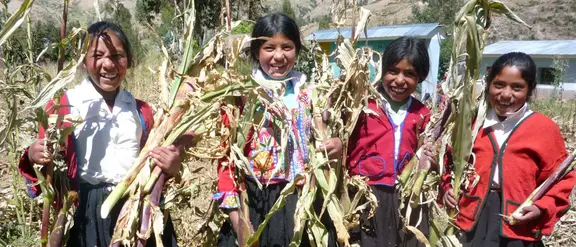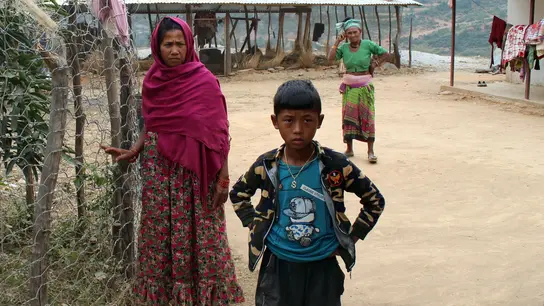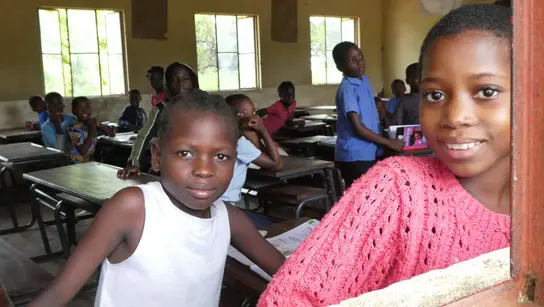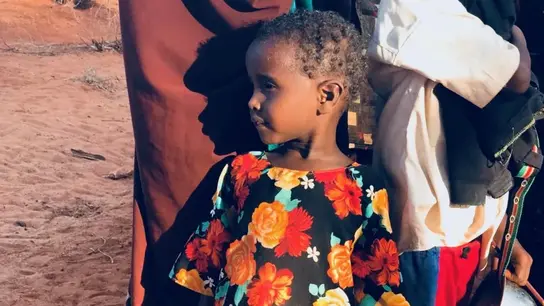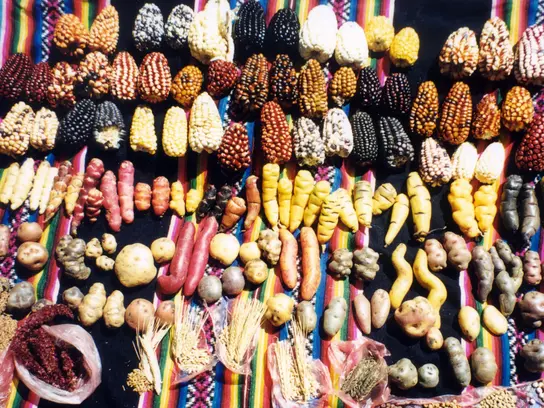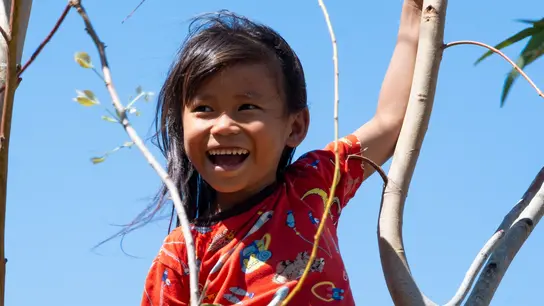Arten sterben aus, Sprachen und Kulturen werden vergessen - Globalisierung und Klimakrise beschleunigen diese Prozesse. Doch mit jeder Sprache, die nicht mehr verstanden wird, verschwindet eine Weltsicht, verschwindet Wissen, mit jeder Pflanze und jedem Tier wird eine mögliche Antwort auf Probleme von heute oder in der Zukunft vernichtet. Wir setzen uns dafür ein, die biologische und kulturelle Vielfalt zu erhalten. Unterstützen Sie uns dabei!
Ihre Spende hilft!
Projekte
Globalisierung und Vielfalt - Daten und Fakten
Biologische und kulturelle Vielfalt schützen!
Mehr als ein Drittel der Säugetier- und Pflanzenarten sind vom Aussterben bedroht. Von den zurzeit rund 6.000 aktiv gesprochenen Sprachen werden noch in diesem Jahrhundert über die Hälfte verloren gehen. Dass Arten verschwinden und Kulturen untergehen, ist nicht neu. Doch durch Globalisierung und Klimawandel beschleunigt sich der Verdrängungsprozess so rasant, dass mehr zerstört wird, als neu entstehen kann. Terre des Hommes setzt sich deshalb für Erhalt und Förderung der biologischen und kulturellen Vielfalt ein. Denn jedes Kind hat das Recht auf ein gesundes Aufwachsen in einer intakten Umwelt. Heute und in der Zukunft.
Kulturelle Angleichung schreitet voran
Kulturen und Menschen entfalten sich durch den Austausch mit anderen, doch die weltweiten Austauschprozesse vollziehen sich im Rahmen ungleicher Machtverteilung. Die Globalisierung ebnet ein, was nicht globaler Mainstream ist: Mittlerweile gibt es überall die gleichen Filme, die gleiche Musik, die gleichen Fast Food- und Mode-Produkte. Lebensweisheiten, Sprachen und vielfältige andere kulturelle Wissensschätze gehen verloren.
Artenvielfalt nimmt ab
Der Mensch vernichtet aber auch viele Tier- und Pflanzenarten. Zum Beispiel wird durch den steigende Einsatz von Maschinen und Agrarchemikalien in der Landwirtschaft die Pflanzen- und insbesondere Insektenvielfalt immer stärker reduziert: Die FAO (UN-Organisation für Ernährung und Landwirtschaft) schätzt, dass in wenigen Jahrzehnten bis zu 75 Prozent des globalen Kulturpflanzen- und Sortenreichtums verschwunden sind. Die entstehenden Monokulturen sind anfälliger für Schädlinge und Krankheiten, was wiederum einen verstärkten Einsatz von Pestiziden zur Folge hat. Die Pestizide gelangen in Flüsse und verunreinigen das Trinkwasser.
Schutz der biologischen und kulturellen Vielfalt
Kinder sind besonders häufig von Pestizidvergiftungen betroffen; sie bekommen Hautinfektionen, Haarausfall oder akute Bauchschmerzen.Dabei hat laut Artikel 24 der UN-Kinderrechtskonvention jedes Kind das Recht ein gesundes Leben zu führen. Auch für den Schutz der kulturellen Vielfalt haben die Vereinten Nationen ein Abkommen unterzeichnet: das »Übereinkommen zum Schutz und zur Förderung der Vielfalt kultureller Ausdrucksformen«.
Terre des Hommes setzt sich zusammen mit seinen Partnerorganisationen dafür ein, dass diese international anerkannten Konventionen auch tatsächlich umgesetzt werden und so die kulturelle und biologische Vielfalt dieser Erde bewahrt wird.
Zahlen
- Alle zwei Wochen stirbt eine Sprache aus.
- Nur zwölf Sprachen füllen 98 Prozent aller Internetseiten.
- Weltweit gibt es 4.000 bis 5.000 indigene Kulturen.
- Mehr als 17.000 Tier- und Pflanzenarten sind vom Aussterben bedroht.
Forderungen und Ziele
Um die biologische Vielfalt zu wahren und Kindern ein gesundes Aufwachsen in einer intakten Umwelt zu ermöglichen, sind international vereinbart Umweltstandards und Schadstoffgrenzen unverzichtbar.
Von der Bundesregierung fordert terre des hommes, sich auf dem UN-Gipfel für nachhaltige Entwicklung in Rio de Janeiro im Juni 2012 für die Rechte von Kindern und kommenden Generationen auf eine sichere, gesunde und intakte Umwelt einzusetzen. Hierzu soll die Bundesregierung eine Ombudsperson ernennen, die unabhängig von kurzfristigen Wirtschaftsinteressen auch das Wohl zukünftiger Generationen vertritt.
In den traditionellen indigenen Gemeinschaften treffen Kinder in der Schule auf eine europäische Unterrichtssprache sowie auf europäische Werte. Die Schulbücher entstammen einer städtischen Welt, die mit keinem Wort auf die Umwelt und den Wissensschatz der ländlichen Bevölkerung eingeht. Das Ergebnis dieser Erziehung sind Entfremdung und Identitätsprobleme. Die Kinder schämen sich ihrer Muttersprache und bäuerlichen Herkunft. Die älteren Gemeindemitglieder empfinden Schule als Angriff auf ihre Werte und kulturelle Identität.
Um die eigene Kultur bewahren zu können, muss deshalb ein Umdenken stattfinden. Der Grundschulunterricht muss in der Muttersprache stattfinden, der Stundenplan einen Bezug zur Lebensumwelt der Schüler haben und ihnen die alten Traditionen näherbringen.
Um dies zu erreichen, unterstützt Terre des Hommes Projekte, die es ethnischen Minderheiten ermöglichen, ihre Kultur zu leben und ihre Sprache, ihre Wissensschätze und ihre Lebensweisheiten an ihre Kinder weiterzugeben. Ökologisches und landwirtschaftliches Wissen bleibt erhalten, Traditionen werden aufgewertet und gegen die Entwürdigung durch sogenannte »Modernisierer« geschützt.
Ihr Ansprechpartner

Jonas Schubert
Referent Advocacy
